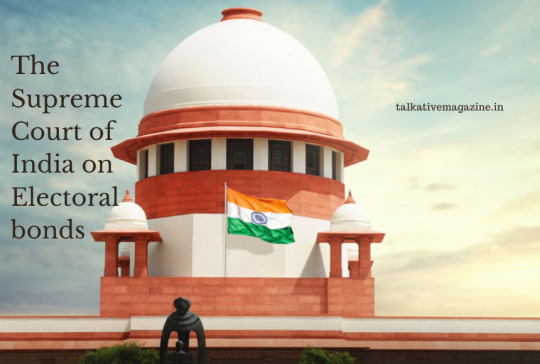#TransparencyInPolitics
Explore tagged Tumblr posts
Text
Secret Donations and Powerful Connections: How Money Influences Politics #campaignfinance #campaignfinancelaws #charitablecauses #darkmoney #electedofficials #Epsteinsconnections #influenceofmoneyinpolitics #integrityofelections #jeffreyepstein #politicalaccountability #politicaldonations #publicdisclosure #returnofdonations #sexualabuseallegations #shadowyfundingsources #shellcompanies #transparencyinpolitics #vivekramaswamy #wealthydonors
#Politics#campaignfinance#campaignfinancelaws#charitablecauses#darkmoney#electedofficials#Epsteinsconnections#influenceofmoneyinpolitics#integrityofelections#jeffreyepstein#politicalaccountability#politicaldonations#publicdisclosure#returnofdonations#sexualabuseallegations#shadowyfundingsources#shellcompanies#transparencyinpolitics#vivekramaswamy#wealthydonors
0 notes
Text
Supreme Court Invalidates Electoral Bonds: Countering Arun Jaitley’s Arguments
In a landmark decision, a five-judge constitution bench of the Supreme Court has declared the electoral bonds scheme unconstitutional, citing its violation of the Right to Information Act and thereby impinging on the Fundamental Right to Freedom of Speech and Expression under Article 19(1)(a) of the Constitution.

Former Finance Minister Arun Jaitley had introduced the Electoral Bonds Scheme on January 2, 2018, in the Lok Sabha, emphasizing its potential to mitigate the influx of black money into political party funding. However, the scheme faced judicial scrutiny, culminating in its recent nullification by the apex court.
Key Points from the Supreme Court Verdict:
The court asserted that transparency regarding political party funding is indispensable, highlighting that the electoral bonds scheme undermines the right to information.
Chief Justice of India D Y Chandrachud elaborated on the inherent quid pro quo between political funding and policy-making, deeming the lack of disclosure regarding corporate funding as unconstitutional.
Contrary to the government’s argument of curbing black money, the court held that the objective doesn’t justify compromising fundamental rights. It applied a three-pronged test, as outlined in the 2017 Justice K S Puttaswamy (retd) v Union of India ruling, emphasizing that the electoral bond scheme wasn’t the least restrictive method available.
The court invalidated amendments to the Income Tax Act and Section 29C of the Representation of the People Act.
Arguments Presented by Arun Jaitley:
In defense of the electoral bonds scheme, Jaitley contended that disclosing individual donor contributions would discourage donations, potentially reverting to less desirable cash-based donations. He argued that the scheme represented a significant improvement in transparency compared to the existing opaque funding system. Jaitley highlighted the prevailing non-transparent political funding ecosystem and emphasized the need for reform. He outlined the features of the electoral bonds scheme, emphasizing its transparency through banking instruments and mandatory disclosure requirements for both donors and political parties.
A recent Supreme Court ruling has invalidated the electoral bonds scheme, a brainchild of former Finance Minister Arun Jaitley, citing its infringement upon the Right to Information Act and fundamental rights enshrined in the Constitution. Introduced in 2018 as a measure to tackle black money in political funding, the scheme faced constitutional scrutiny, culminating in its annulment by the apex court.
The court’s decision underscored the imperative of transparency in political funding, rebuffing the government’s argument of curbing black money through the electoral bonds scheme. Chief Justice D Y Chandrachud elucidated the symbiotic relationship between political funding and policymaking, deeming the lack of disclosure regarding corporate funding unconstitutional. Additionally, the court applied a rigorous test, concluding that the scheme failed to meet the standards of least restriction on fundamental rights.
Jaitley, in defense of the electoral bonds scheme, argued that mandatory disclosure of donor contributions could dissuade donations, potentially reverting to less desirable cash-based transactions. He emphasized the scheme’s role in enhancing transparency compared to the existing opaque funding practices.
In essence, the Supreme Court’s verdict not only nullifies the electoral bonds scheme but also underscores the significance of transparency and accountability in political funding, setting a significant precedent for future electoral reforms.
0 notes
Text
Supreme Court Declares Electoral Bond Scheme Unconstitutional: Key Directions and Implications
🚨 BREAKING: Supreme Court strikes down Electoral Bonds scheme as UNCONSTITUTIONAL! 💥 This landmark judgment brings transparency to political funding. Read more on the Link. #ElectoralBonds #SupremeCourtDecision #TransparencyInPolitics 🇮🇳🔍
In the financial year 2017-2018 during the Union Budget, the Narendra Modi government introduced Electoral Bonds as a Finance Bill, 2017. The Government of India presented the bill in the Parliament and passed unconstitutionally as reported by establishing this practice would enable transparency and anonymity among the donors and parties accepting Electoral Bonds. Since then, the major and…

View On WordPress
#Article 14 of Indian Constitution#CJI DY Chandrachud judgements#Electoral Bonds Judgement#Supreme Court of India
0 notes
Text
Secret Donations and Powerful Connections: How Money Influences Politics #campaignfinance #campaignfinancelaws #charitablecauses #darkmoney #electedofficials #Epsteinsconnections #influenceofmoneyinpolitics #integrityofelections #jeffreyepstein #politicalaccountability #politicaldonations #publicdisclosure #returnofdonations #sexualabuseallegations #shadowyfundingsources #shellcompanies #transparencyinpolitics #vivekramaswamy #wealthydonors
#Politics#campaignfinance#campaignfinancelaws#charitablecauses#darkmoney#electedofficials#Epsteinsconnections#influenceofmoneyinpolitics#integrityofelections#jeffreyepstein#politicalaccountability#politicaldonations#publicdisclosure#returnofdonations#sexualabuseallegations#shadowyfundingsources#shellcompanies#transparencyinpolitics#vivekramaswamy#wealthydonors
0 notes